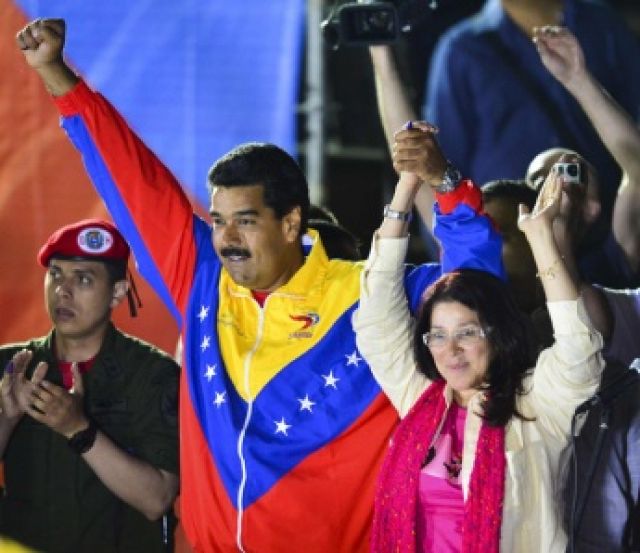
The room erupted into cheers when the election results were announced. For hours, the city of Merida's most ardent supporters of socialist presidential candidate Nicolas Maduro had gathered in the local offices of the United Socialist Party of Venezuela (PSUV). However, after a few moments, the closeness of the numbers sank in.
At the time of writing, the National Electoral Council (CNE) had announced that with 99% of votes counted, the PSUV's Maduro won with 50.6%. His closest rival, Henrique Capriles, received 49.1%; giving Maduro a slim 1.5% victory.
In the last presidential elections, Maduro's predecessor Hugo Chavez defeated Capriles – the candidate of the US-backed right wing hostile to the Chavez-led Boliviaran revolution -- by just over 10%. Many supporters of the revolution were expecting a similar result.
Last month, a joint Barclays/Datanalisis report gave Maduro a 14.4% lead, while pollster Hinterlaces predicted his victory would be 18%.
Despite the unexpectedly close result, Chavistas celebrated outside the offices with fireworks and music. Throughout the city, carloads of supporters waved red flags, chanting slogans.
By midnight a crowd had gathered in the main square, but for a Chavista gathering it was uncharacteristically subdued. There was an air of uncertainty; despite a turnout of over 78%, Maduro not only fell short of his lofty goal of 10 million votes, but failed to deliver the overwhelming victory that most pundits expected.
Although Capriles had repeatedly stated during his election campaign that his victory was all but inevitable, the right-wing candidate likewise failed to live up to the expectations of many supporters.
At the time of writing, Capriles was yet to accept the results. “We are not going to recognise the result until every vote is counted, one by one,” he stated on Venezuelan television. He further described Maduro's victory as “completely illegitimate”, after previously accusing the government and CNE of undermining the voting process.
Likewise rejecting the results, Merida's opposition neighbourhoods became filled with the sound of cacerolazo; a form of protest involving the clapping of pots and pans outside windows. Despite the competing displays in the streets, no violence had been reported in Merida at the time of writing.
Throughout the day, Green Left Weekly visited a number of polling stations in Merida, and observed voting take place in an orderly manner. A strong military and police presence was maintained to keep the peace until late into the night, though many opposition supporters were seen grouped outside the largest station in Merida during the afternoon.
Accusing the government of trying to “interfere” with the ballots, Capriles encouraged supporters to remain on the streets after voting. He also called for an “avalanche” of opposition voters to descend on polling stations mid-afternoon; something which didn't happen at any stations visited by Green Left.
However, elsewhere in the country some disturbances were reported. In Sucre, Miranda state, Venezuela Analysis reported some “opposition led” violence, while El Universal reported an opposition youth leader had been detained by authorities for campaigning. All forms of electoral campaigning during the voting period is illegal in Venezuela.
The final week of campaigning was also marred by security threats, with the government announcing on April 12 that a plot to destabilise the country had been neutralised.
The previous day, during a series of early morning raids security forces uncovered a group of Colombian paramilitaries in possession of Venezuelan military uniforms, C4 explosives and 50 high capacity assault rifle magazines. Two arrests were made.
Even now that the vote is over, the general sense of uncertainty endures. Although Maduro stated in his victory speech that a new era for the revolution is beginning, it is yet to be seen if the government he leads will deepen the revolutionary process towards socialism, or pursues a more moderate agenda.
For now, however, Chavista street parties are continuing in Merida, while in Caracas thousands turned out to see Maduro's acceptance speech. Today's vote may have been less than the overwhelming victory hoped for, but it was a victory nonetheless.
[Ryan Mallett-Outtrim is a Green Left Weekly journalist based in Merida.]
